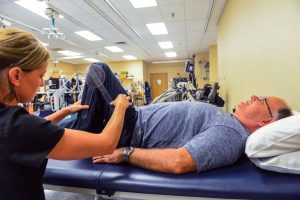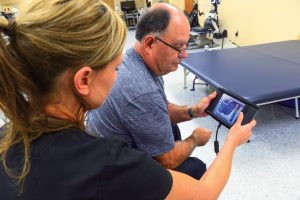The Department of Veterans Affairs has long been touted as the best health care option for those with SCI/D
No one likes getting sick, but besides general health concerns, there’s a whole host of secondary issues that must be kept under observation when you have a spinal-cord injury or disease (SCI/D). Receiving effective, timely care for those issues can be a matter of life and death, and it’s often hard to come by outside of the Department of Veterans Affairs (VA), as clinicians who specialize in SCI/D are few and far between. Paralyzed Veterans of America (PVA) has long advocated for veterans who are eligible for health care through the VA to seek care there rather than the private sector, especially for veterans with SCI/D. However, the reasoning behind why the VA provides the best care for veterans with SCI/D is sometimes forgotten. It comes down to the difference between comprehensive lifetime coordinated care and fragmented care.

One-Stop Shop
Ken Klein, PVA Minnesota Chapter president and national director, is familiar with both types of care. After becoming paralyzed in 2001 in a private airplane crash, the Navy veteran sought care at a private health care clinic. But for the last seven or eight years, Klein has gone to the Minneapolis VA Health Care System for his yearly exams and says what he finds most comforting is that it’s a “one-stop shop, everything under one roof.”
“At times when I was on the outside world and getting a physical, you’re in there, you see one person, he takes your blood pressure, takes some blood samples and stuff and that’s about it,” Klein says. “You don’t see anybody, [a] PT [physical therapist] or OT [occupational therapist] or social worker or psychologist. None of that is available to you on a physical on the outside world.”
Klein says the biggest factor in his decision to switch to the VA permanently came when he had to have surgery in 2009 and the medical staff didn’t turn him for two days.
“They didn’t know how to handle a paraplegic at the time,” Klein says. “So, I just lay there in bed for two days without turning myself. If it hadn’t been for my wife complaining, they wouldn’t have started to turn me.”
Alberto Martinez, MD, knows firsthand the difficulties SCI/D patients face in navigating health care outside of the VA. Martinez is a neurologist who worked in spinal-cord injury (SCI) research at the Walter Reed Army Institute of Research in Silver Spring, Md., as well as the University of Miami’s Miami Project to Cure Paralysis. He was chief of the SCI Unit in the Miami VA Healthcare System from 2003 to 2016 and still works there as a staff physician. Martinez says most SCI/D care outside of the VA is relegated to rehabilitation centers. That creates an issue because if a person with SCI/D becomes ill after graduating from rehab and returning home to live independently, he or she can’t go to the rehab center for follow-up care unless it’s a simple complication such as a urinary tract infection or a cold. While there are a few non-VA institutions that offer continued care for SCI/D, some are more comprehensive than others and the care is very limited. Few primary care, general medicine or internal medicine clinicians outside of the VA possess the expertise to understand neurogenic bladder management, autonomic dysreflexia or other issues particular to SCI/D, Martinez says.
“What happens if you happen to have a spinal-cord injury, you’re quadriplegic, you get pneumonia and you wind up in general medicine in the hospital, and they don’t know how to take care of the spinal-cord issues?” Martinez says. “You really can’t coordinate things. They don’t know about taking care of the bowel programs … we know how to make that happen in [the] Spinal-Cord Injury [Unit], especially with the nursing staff.”
Coordinating Care
That coordinated care makes it easier when Klein needs to see a doctor about his diabetes. He’s typically seen within two days at the Minneapolis VA’s Spinal Cord Injury and Disorder Center. For his annual physical, the center calls him ahead of time to schedule the exam, sends him the list of disciplines he will see and the date and time of day.
“They completely go through any needs I might have, how things are happening, how good things are at home, anything that can make my life better,” Klein says. “Then the physical therapist will take over and works you out on a mat to make sure everything is the same as what it was the prior year, if not better.”
Martinez says many times outpatients outside of the VA system can get lost in the shuffle. The VA SCI centers provide all primary care for the patient, as well as all specialty care and rehabilitation. If someone with SCI/D gets sick, he or she is admitted to the SCI floor, and there’s an SCI doctor caring for the veteran and coordinating everything, including equipment.
“You’ve gotta struggle to get a proper wheelchair on the outside. You have to fight for every nut and bolt,” Martinez says. “Here, we get together, we determine what the patient needs, we have an evaluation. Everyone has their say, and it’s much easier to get equipment if you’re a spinal-cord injury veteran … It’s almost day and night in many ways.”
Martinez says rehabilitation at a VA SCI center is more forgiving, and he believes many outside rehab centers have recently been forced to curtail length of stays under the pressure of insurance companies.
“That’s very important, because the typical spinal-cord injury patient in the VA is older,” Martinez says. “So let’s say, over at the University of Miami, the typical age of a spinal-cord injury is maybe in the mid- to late-30s. That person’s not going to have the medical baggage that a 65- or 67-year-old will have. So, for somebody to get up and at it and rehabilitate, it’s a slower process when they come in and they’re older and they have medical issues.”
Another benefit of the VA, Martinez says, is when it comes to doctors prescribing medication.
“[Outside the VA] you don’t know what the other person is exactly doing. You’ve got people using different medications,” Martinez says. “One of the things I like about the VA, when a veteran’s getting all their meds here, I’ve got a very active pharmacy staff that’s looking at everything and keeping me honest. You lose that a little when you go outside.”
Martinez admits some specialties, such as urology, plastic surgery and orthopedics, can have longer wait times because the demand is higher. However, he believes that using different specialists outside the VA can get convoluted, especially if you have medical issues.
“One of the beauties of the VA is the medical records,” he says. “Outside, everybody’s got their own system. You can’t see or talk to each other. Here, if I see a patient who lives in Alaska, I’ve got access to their records.”
Lifetime Health
A great deal of credit for the quality of care veterans receive at those specialized centers goes to PVA, Martinez says.
“This is something PVA has really advocated for and it would not be possible without them,” Martinez says. “They made us gather these resources, they help us maintain these resources, and it’s just incredible. You couldn’t get this care anywhere.”
PVA National President David Zurfluh has personally experienced shifts in the quality of care he’s received over the last 22 years.
“The first 15 years were great, but the last 12 years have been adequate to poor at best,” Zurfluh says. “This, I believe, has been the result of staffing shortages and trying to do more with less. Good in the short term, disastrous in the long term. I have seen experienced staff burn out and leave and incoming new staff try to hold care together and learn the SCI/[multiple sclerosis] culture and at best achieve adequate care with limited resources and budgets. Until budgets, resources and staffing are increased and tenure encouraged, care will continue to be, in my opinion, adequate at best.”
That’s where PVA comes in. Zurfluh says there are three critical ways the organization affects VA care.
“PVA has influenced the policies of VA care in Washington, D.C.,” Zurfluh says. “[National service officers] monitor care and navigate our members through the process of understanding and obtaining their benefits. The Medical Services Department through site visits ensures that quality care in specialized services is delivered to our members.”
Martinez says he believes PVA is the strongest advocate for people with SCI/D in the U.S. and helps hold VA hospitals and leadership accountable for maintaining resources. PVA is an important resource when it comes to educating outside providers, as well.
“I have patients who I tell them, ‘Go to the PVA website, download the pamphlet, and when the paramedics come in because you’re having autonomic dysreflexia, give them that and take it to the emergency room with you,’ ” Martinez says. “They really don’t know it. They don’t see it. They’re not aware of it.”
The most significant thing the VA SCI centers do for veterans with SCI/D is provide lifetime care, Martinez says.
“I think one of the strengths of the system is how to help these patients cope and remain independent as they age with their spinal-cord injury,” Martinez says. “It’s amazing the resources we have. Each spinal-cord center has a dedicated spinal-cord injury home care [team]. They do an incredible job. We keep spinal-cord injured, paralyzed patients in their homes, and they’re in their 80s. They’re able to live independently.”
Continuing to live an active lifestyle is why Klein says the VA will always be his first choice.
“I’m very active, participating in a lot of events, and I think if I didn’t get the care that the spinal-cord injury center has given me, I’m not too sure if I could’ve continued on with what I’ve been doing,” Klein says.



